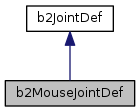#include <b2MouseJoint.h>
Inheritance diagram for b2MouseJointDef:

Public Member Functions | |
| b2MouseJointDef () | |
 Public Member Functions inherited from b2JointDef Public Member Functions inherited from b2JointDef | |
| b2JointDef () | |
Public Attributes | |
| float32 | dampingRatio |
| The damping ratio. 0 = no damping, 1 = critical damping. More... | |
| float32 | frequencyHz |
| The response speed. More... | |
| float32 | maxForce |
| b2Vec2 | target |
 Public Attributes inherited from b2JointDef Public Attributes inherited from b2JointDef | |
| b2Body * | bodyA |
| The first attached body. More... | |
| b2Body * | bodyB |
| The second attached body. More... | |
| bool | collideConnected |
| Set this flag to true if the attached bodies should collide. More... | |
| b2JointType | type |
| The joint type is set automatically for concrete joint types. More... | |
| void * | userData |
| Use this to attach application specific data to your joints. More... | |
Detailed Description
Mouse joint definition. This requires a world target point, tuning parameters, and the time step.
Definition at line 26 of file b2MouseJoint.h.
Constructor & Destructor Documentation
|
inline |
Definition at line 28 of file b2MouseJoint.h.
Member Data Documentation
| float32 b2MouseJointDef::dampingRatio |
The damping ratio. 0 = no damping, 1 = critical damping.
Definition at line 50 of file b2MouseJoint.h.
| float32 b2MouseJointDef::frequencyHz |
The response speed.
Definition at line 47 of file b2MouseJoint.h.
| float32 b2MouseJointDef::maxForce |
The maximum constraint force that can be exerted to move the candidate body. Usually you will express as some multiple of the weight (multiplier * mass * gravity).
Definition at line 44 of file b2MouseJoint.h.
| b2Vec2 b2MouseJointDef::target |
The initial world target point. This is assumed to coincide with the body anchor initially.
Definition at line 39 of file b2MouseJoint.h.
The documentation for this struct was generated from the following file: